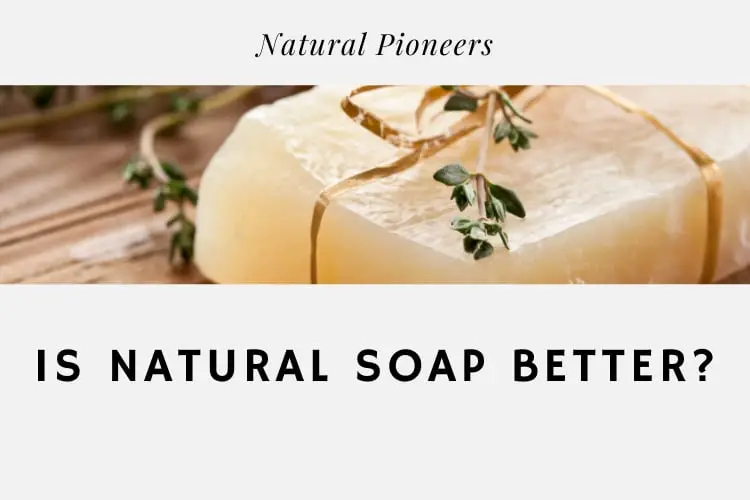
Natural soap is on the rise. Here, you’ll learn how it’s made, how it’s different from regular soap, whether it’s effective, antibacterial, contains toxins, and if bar or liquid soap is better.
Natural soap has better hydrating and moisturizing properties and is as effective as regular soap. Next to glycerin, it commonly contains oils & butters which add 1-20% of nourishing “superfat”. Unlike regular soap, natural soaps are free of toxins and made with few and basic ingredients.
Let’s learn what natural soap is.
1. What Is Natural Soap?
Soap is a combination of fats or oils with an alkali (lye).” [1]
All natural soap – liquid or bar soap – is made during the saponification process. Saponification means “soap making”, and is a chemical reaction that occurs when fats or oils come into contact with an alkali.
So, remember: No Lye, No Soap!
Is Natural Soap Organic?
When we hear the word “natural soap” we might think of something non-toxic, organic, containing essential oils and herbs, that is produced without animal testing, perhaps locally made with a minimal carbon footprint and is packaged without plastics.
Am I close?
You need to understand that the FDA has no definitions for “natural” or “organic” in soap. Unlike “organic spinach” which needs to grow on organic soil without the use of pesticides, and so on, soap is made through a chemical reaction of fat and lye. [2]
While organic ingredients such as fats, butters, essential oils or herbs may be added to a soap, the laws and regulations that the FDA enforces, do not have definitions for “organic” soap. [3]
Is Natural Soap Harsh?
Soap has a bad reputation for being harsh on our skin. But is that true? Yes and no. In the past, soap makers often lacked consistent quality & strength of lye which resulted in highly alkaline soap. Let’s put this into perspective. The pH tells us how acidic or basic something is. Our skin has a pH value of about 5. And the closer a soap’s pH value is to the one of our skin, the betterour skin can maintain its natural pH balance.
When, however, our skin comes in contact with a highly alkaline soap, this literally begins to erode your skin’s structure. It runs dry and looses its hydration.
Why is this so bad? Because it is the foundation of many skin disorders, like acne, psoriasis and eczema.
Studies show that acne mainly occurs on skin with higher than normal pH values. That is, skin which has lost it’s natural and balanced pH state. [4]
Remember: the closer a soap’s pH value is to our skin, the healthier a soap is!
While we don’t face quality issues with lye anymore, we currently face a different issue. With the aim to reduce production cost and offer a broader range of products, let’s see what happens with our soap.
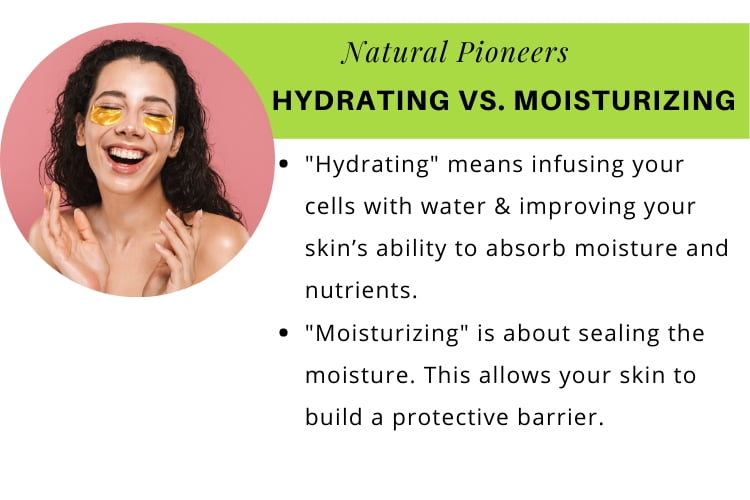
Natural Soap Contains Glycerin
During saponification, glycerin is made as a natural by-product. By default, soaps have glycerin in them, about 5-10%. Glycerin pulls water into the outer layer of your skin and traps it there. That means, it effectively hydrates and moisturizes our skin. If you find soap with higher glycerin amounts, it may have been added afterwards. [5]
As you can imagine, glycerin is a valuable component in soap – and when extracted, the soap no longer contains hydrating and moisturizing features. But exactly this is done. Soap manufacturers extract the glycerin from the soap and put it in lotions and creams. The resulting drying effect of the soap has us come back for lotion to fix the problem. Well done, everyone.
While this might sound like a big conspiracy theory, that’s really not what I’m going for. It’s a simple fact. And by using natural soaps that still contain all the good glycerin with its hydrating and moisturizing features, you completely get around that.
Note: If you still want to use lotion after you shower, is completely up to you. For me personally, I have found my skin to be so well-balanced after making the switch to natural soap, that I completely skip that step.
Curious about Dead Sea mud soap? Learn more in our article: What Is Dead Sea Mud Soap Good For?
Conclusion: Soap is a combination of fats or oils with an alkali (lye). During the soap making process (saponification), a chemical reaction turns the fats/oils and lye into soap and glycerin. Therefore, glycerin is a natural by-product of saponification. About 5-10% in soap is glycerin which effectively hydrates and moisturizes skin. While many commercially produced soaps extract glycerin for the use in lotions and creams, natural soap generally remains untreated and is therefore less drying. The FDA has no definitions for “natural” or “organic” in soap that means any soap can be labeled “natural”. While organic ingredients may be added to a soap, the FDA laws and regulations have no definitions for “organic” soap.
2. Is Natural Soap Effective?
Naturally, we want our soap to be effective, which means it should do a fine job in cleaning our hands or body. Let’s take a look at studies to see how effective regular soap is, and whether a natural soap is different in that regard.
According to studies, handwashing with water alone reduces the presence of bacteria to 23%. If we use plain soap and water, the presence of bacteria is further reduced to 8%. [6]
As we’ve defined in the precious chapter, natural soap commonly only differs from commercially available soaps in the fact that its glycerin isn’t extracted. Therefore, natural soap has the same cleaning properties as any other soap. However, the included glycerin won’t dry your skin but hydrates and moisturizes it.
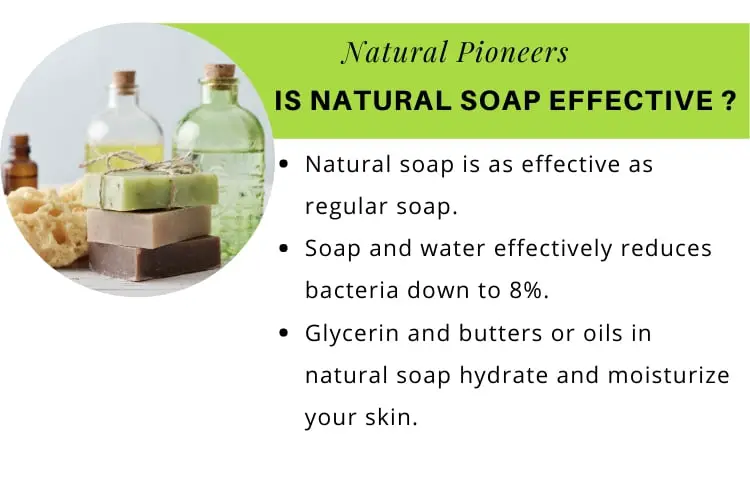
It is that very moisturizing property that had us doubt the effectiveness of natural soap in the first place. Whereas many of us were used to this squeaky clean, super dry feeling on our hands from soap without glycerin, the absence of that sensation felt wrong. Natural soap with glycerin moisturizes and cleanses our skin at the same time. It just takes a little time to get used to that new feeling.
Curious about evidence-based bath salts? Read more in our Quick And Easy Guide To Bath Salts
Conclusion: Natural soap is as effective as commercially available soap. The glycerin in natural soap leaves our skin with a hydrated and moisturized feeling after washing. This is commonly misunderstood and interpreted as less effective. Natural soap cleanses our skin like any other soap and additionally provides a hydrating factor.
3. Is Natural Soap Antibacterial?
When we think of antibacterial soap, we think of something that does a better job of eliminating bacteria than soap. Especially when we’re sick or around people who are sick, we want to make sure no bacteria is being transferred.
Antibacterial soaps, also called antimicrobial or antiseptic soaps, contain certain chemicals not found in natural soaps. Those ingredients are added to reduce or prevent bacterial infection. So far, so good.
Is Antibacterial Soap Better Than Regular Soap?
Let’s take a look at some studies to understand how antibacterial soap works when compared to regular soap. What we already know is that handwashing with water alone reduces the presence of bacteria to 23%. If we use plain soap and water, the presence of bacteria is further reduced to 8%. [7]
Hence, what we’re expecting from an antibacterial soap is that it would reduce the remaining 8% even more.
In 2013, the FDA required manufacturers of anti-bacterial soap to show proof of efficacy and safety. In other words, show us that anti-bacterial soap works and that it’s safe. [8]
Here’s the studies on antibacterial soap:
- The tested antibacterial products did not reduce the risk of viral infections. [9]
- There was no difference found between households given plain soap compared with those given antibacterial soap. [10]
- Soaps with the antibacterial ingredient triclosan were no more effective than plain soap at preventing infectious diseases or reducing bacteria. [11]
- Antibacterial soaps show no health benefits over plain soaps. [12]
- To date, there has been no evidence to suggest household antibacterial soaps are an improvement over regular soaps. [13]
“I suspect there are a lot of consumers who assume that by using an antibacterial soap product, they are protecting themselves from illness, protecting their families. But we don’t have any evidence that that is really the case over simple soap and water.” [14]
Sandra Kweder, deputy director of the FDA’s drug center
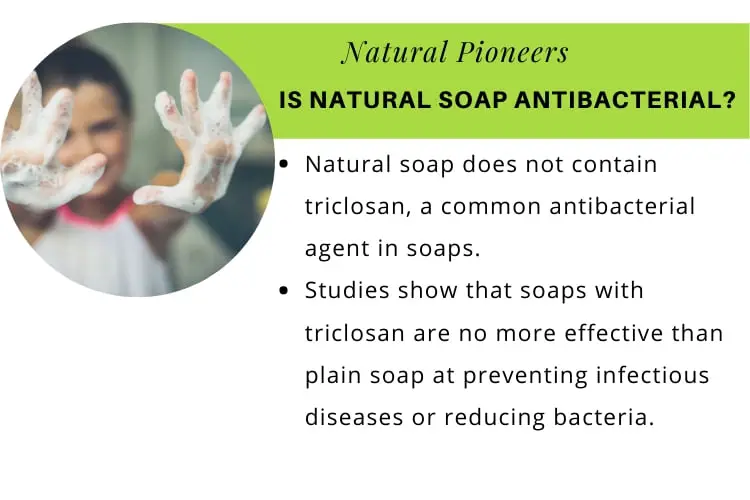
As you can see, despite the studies that were conducted, manufacturers couldn’t prove that those ingredients are safe for daily use neither could they show that these ingredients are any more effective than plain soap and water in preventing the spread of infections. [15]
Therefore, the FDA’s decided that antibacterial soaps and body washes will no longer be able to be marketed. This rule does not apply to hand sanitizers or hand wipes. It also does not apply soaps used in hospitals and nursing homes. [16]
Is Antibacterial Soap Bad For You?
We now know that antibacterial soaps are no more effective than regular or natural soaps. But is there something about them that could potentially harm our health?
You might have heard of people who eat lots of commercially (non-organic) chicken and animal products like dairy and eggs and later discover that no antibiotics work for them anymore. That is because the antibiotics used in commercially favor the emergence of resistant bacteria in animals. Resistant bacteria is then transferred to humans through meat, eggs and milk with resistant bacteria. [17]
Antibacterial soap acts in a similar way. Because of the way the antibacterial agent triclosan reacts in cells, it causes some bacteria to mutate and become resistant to commonly used drugs. [18]
And there is more research on the topic:
- In animal studies, triclosan changes the way some hormones work in the body which makes it a hormone disruptor. [19]
- Several studies demonstrated the emergence of antibiotic-resistant bacteria from the use of triclosan. [20]
- Studies have confirmed that the of use of triclosan represents a potential public health risk because of resistance to clinically important antimicrobials. [21]
- Triclosan induces a high risk of antibiotic tolerance and reduces antibiotic efficacy a 100-fold. [22]
- Triclosan exposure is associated with increased BMI. Moderate exposure to antibacterial soap may increase your waistline. [23]
Conclusion: Natural soap contains no ingredient that is commonly used in soap labeled “antibacterial”. However, natural soap, like any regular soap, is proven to reduce the presence of bacteria down to 8%. According to studies, antibacterial soap is no more effective than regular soap. To the contrary, the triclosan in antibacterial soap acts as a hormone disruptor, can increase your waistline, causes the emergence of antibiotic resistant bacteria, and can reduce antibiotic efficacy by 100 times. Therefore, the FDA decided that antibacterial soaps and body washes can no longer be marketed and recommends the use of soap and water.
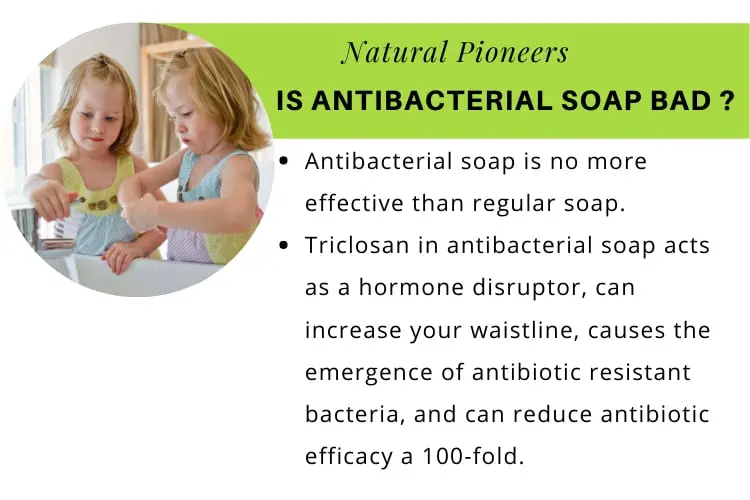
4. Is Natural Soap Better For Skin?
Most soap that is labeled “natural” contains glycerin, a natural by-product of the soap making process (saponification). Glycerin improves skin hydration, skin barrier function, has protective properties, and accelerates wound-healing. When it comes to treating dry skin, glycerin is as powerful as urea. [24], [25]
That means without additional lotion or creams, glycerin in natural soap can hydrate and moisturize your skin. When we take a look at ideal moisturizer features in studies, we recognize that glycerin has us covered before we even leave the shower.
- Reduces and prevents further dehydration
- Enhance the skin’s moisturizing retention mechanism
- Be absorbed immediately, providing immediate hydration
- Be affordable [26]
While most commercially produced soap has its glycerin extracted and put in lotions and creams, you’ll feel the difference in your skin when choosing a natural soap.
Can I Use Natural Soap To Wash My Face?
While this may sound like a no-go for many women, the right kind of soap can make a big difference. Even people with skin disorders like acne can benefit from natural soap. Here’s a dermatologist’s take on it:
“Soap isn’t necessarily bad for acne, but the wrong type of soap or cleanser can irritate the skin, making acne worse or making it difficult to use appropriate acne medications — many of which are drying.” [27]
Dr. Kathleen Welsh
Studies show skin disorders like acne occur more often when our skin pH is more on the alkaline side. Which is the case when we use highly alkaline regular soap. [28]
Natural soaps, on the other hand, commonly use skin beneficial herbs, oils, butters, and aromas which provide even more moisture than glycerin alone. Moreover, many natural soap producers use a process called superfatting in which they either add an extra amount of oil or reduce the amount of lye resulting in about 1-20% extra nourishing “superfat”.
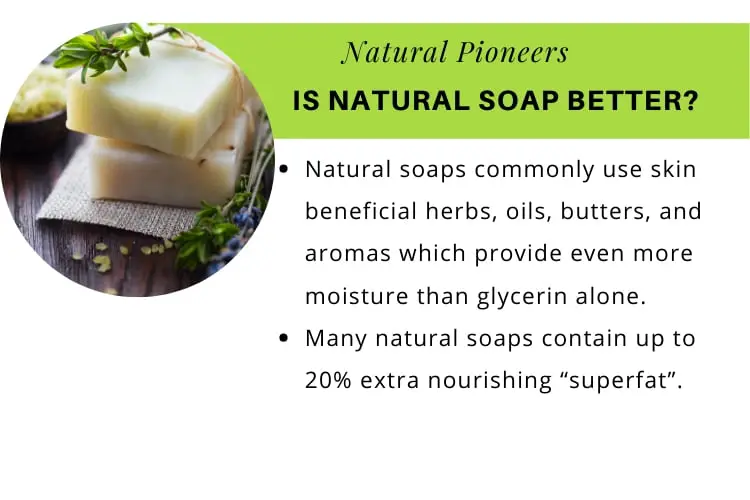
Maintaining Our Natural Skin pH Is Key To Healthy Skin
Whereas many adults and teenagers think that skin disorders are caused by improperly cleaned skin, it really is a combination of genetics, stress, bacteria, diet and hormones. [29]
Since we can’t do much about our genetics when it comes to healthy skin, we can definitely work on a clean diet and make sure our hormones aren’t disrupted from toxins in our food and beauty products.
Is All Regular Soap Bad?
Not all commercially produced soap has its glycerin extracted. If you do a good job reading the labels you might find products with glycerin. However, let’s take a look at the toxicity in regular soaps before we head off to the store.
Is Natural Soap Non-Toxic?
With the booming “clean beauty” movement, many people have started to question whether the ingredients in their beauty products are safe and non-toxic. Remember, the skin is our largest organ and many synthetic ingredients can be absorbed through our skin.
- Studies show that chemicals found in cosmetics and personal care products may not only act as hormone disruptors but may also cause reproductive problems. Children are generally exposed to the same chemicals as their mothers. [30]
- Another study done on pregnant women could find chemicals in urine samples and could trace them back to their use of liquid soap, sunscreen, lotion and cosmetics. [31]
- Generally, women of color have show higher levels of chemicals from beauty products in their bodies when compared with white women. [32]
As you can see, most commercially produced soaps and cosmetics contain significant amounts of toxins that are absorbed through our skin. They are known to cause cancer, can cause developmental & reproductive problems, cause allergies, or harm our immune system. [33]
The worst thing about it? Often, their presence is not noted on labels. [34]
If you find yourself super worried right now, breathe. You can take active steps towards minimizing the chemical load you expose yourself to. First, I invite you to check out EWG’s Skin Deep Database. Here, you can check the products you have at home and make safe choices when buying new ones each time.
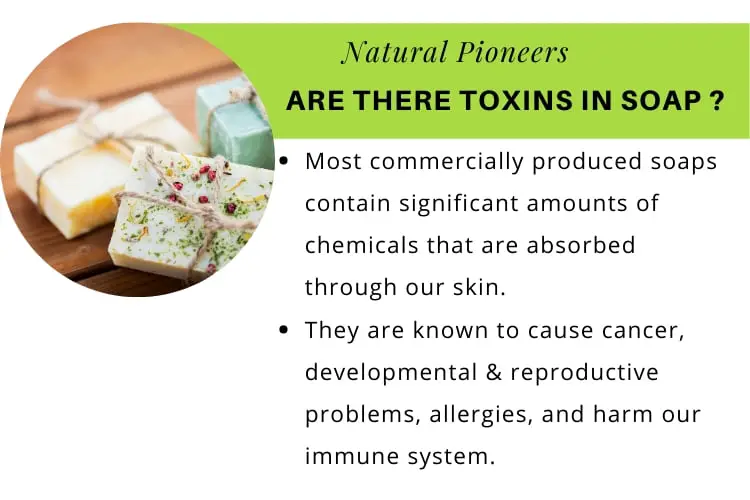
So, what about chemicals in natural soap?
Most producers of natural soap have strong values and you often find them marketed as eco-friendly, cruelty-free, vegan, all natural, and more. Especially when buying from local producers, commonly only very few and basic ingredients are put into a soap. And since they use it on themselves, they hardly ever use anything toxic in their soap-making.
While this might sound very generic, there simply is no definition by the FDA when it comes to “natural” soap. Consequently, anyone can put the “natural” label on their product.
However, you can make sure to buy toxin-free natural soaps when you do your research at least once and then stick with that product. Use EWG’s Database and look for bar soap, body wash, or hand soap.
For people with eczema, I strongly recommend you also look for the NEA Seal of Acceptance™ and check their website for recommended products. Likewise for people with psoriasis. Use the National Psoriasis Foundation’s website to find safe and tested products.
Curious about bath salts for dry skin? Read more in our article Best Bath Salt For Dry Skin.
Conclusion: Overall, natural soap has more skin beneficial ingredients and is produced without toxins. Whereas commercially produced soaps commonly extract the glycerin from soap to put it in lotions and creams, most natural soap still contain glycerin. Glycerin improves skin hydration, skin barrier function, has protective properties, and accelerates wound-healing. Moreover, natural soaps commonly use skin beneficial herbs, oils, butters, and aromas which provide even more moisture than glycerin alone. When a superfatting process is used, natural soap may contain about 1-20% extra nourishing “superfat”.
When it comes to toxins, most commercially produced soaps and cosmetics contain significant amounts of chemicals that are absorbed through our skin. They are known to cause cancer, developmental & reproductive problems, allergies, and harm our immune system. Whereas there is no guarantee, the majority of natural soap producers use only very few and basic ingredients and have strong values with regard to chemical exposure, the environment and animals.
5. Liquid Soap Vs. Bar Soap
While liquid soap is commonly the preferred option, bar soap is on the rise. And there are many good reasons to make the switch.
According to a study conducted at the Swiss Federal Institute of Technology Zurich, bar soap production requires significantly less chemical raw materials. Moreover, bar soap is generally wrapped in eco-friendly paper whereas liquid soap comes in plastic bottles. Hence, bar soap requires far less packaging materials compared to liquid soap.
The researchers also found that when washing, we use more liquid soap than bar soap. That means bar soap will last us much longer. Finally, when we consider the carbon footprint or impact on the environment, liquid soap is less efficient to transport and typically comes in a plastic container which is not completely recyclable.
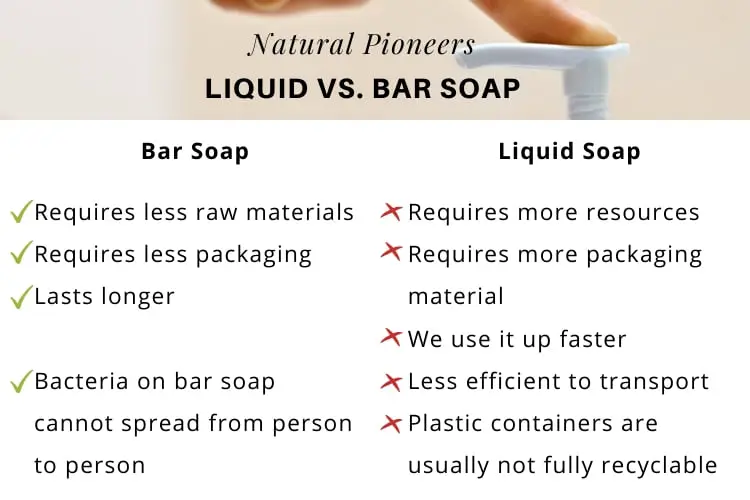
Is Bar Soap Unsanitary?
We repeatedly hear that question from our readers. If you think about it, how can a product that is supposed to make us clean not be sanitary?
Let’s see what studies found.
One study found that washing with contaminated bar soap is unlikely to transfer bacteria. The study finishes by recommending the use of bar soap to prevent disease. [35]
Another study shows that when it comes to spreading bacteria through bar soap:
- Bacteria are not transferred from person to person through bar soap
- Bar soaps don’t support the growth of bacteria [36]
Stay curious and ask questions. The more we learn, the better choices we can make!
Bar soap does not transfer bacteria from person to person and bacteria cannot grow on a bar of soap. Breathe – you can continue to use bar soap.
Conclusion: Based on our findings, bar soap is the better choice. Its production requires significantly less chemical raw materials and requires far less packaging materials compared to liquid soap. Bar soap lasts us longer since research shows that we use more liquid soap than bar soap. When it comes to the impact on the environment, liquid soap is less efficient to transport and typically comes in a plastic container which is not completely recyclable. Bar soap is safe to use. Bacteria cannot grow on bar soap nor can it spread from person to person.
6. Conclusion
Soap is a combination of fats or oils with an alkali (lye). During the soap making process (saponification), a chemical reaction turns the fats/oils and lye into soap and glycerin. Therefore, glycerin is a natural by-product of saponification. About 5-10% in soap is glycerin which effectively hydrates and moisturizes skin.
While many commercially produced soaps extract glycerin for the use in lotions and creams, natural soap generally remains untreated and is therefore less drying. The FDA has no definitions for “natural” or “organic” in soap that means any soap can be labeled “natural”. While organic ingredients may be added to a soap, the FDA laws and regulations that have no definitions for “organic” soap.
Natural soap is as effective as commercially available soap. The glycerin in natural soap leaves our skin with a hydrated and moisturized feeling after washing. This is commonly misunderstood and interpreted as less effective. Natural soap cleanses our skin like any other soap and additionally provides hydration.
Natural soap, like any regular soap, is proven to reduce the presence of bacteria down to 8%. Antibacterial soap, on the other hand, is no more effective than regular soap. To the contrary, the triclosan in antibacterial soap acts as a hormone disruptor, can increase your waistline, causes the emergence of antibiotic resistant bacteria, and can reduce antibiotic efficacy by 100 times. We support the FDA’s recommendation to use (natural) soap and water to clean your hands and strictly avoid antibacterial products.
Overall, natural soap has more skin beneficial ingredients and is produced without toxins. Next to its glycerin content, natural soaps commonly use skin beneficial herbs, oils, butters, and aromas which provide even more moisture than glycerin alone. When a superfatting process is used, natural soap may contain about 1-20% extra nourishing “superfat”.
When it comes to toxins, most commercially produced soaps and cosmetics contain significant amounts of chemicals that are absorbed through our skin. They are known to cause cancer, developmental & reproductive problems, allergies, and harm our immune system. Whereas there is no guarantee, the majority of natural soap producers use only very few and basic ingredients and have strong values with regard to chemical exposure, the environment and animals.
When given the choice, natural bar soap is the better choice. Its production requires significantly less chemical raw materials and requires far less packaging materials compared to liquid soap. Bar soap lasts us longer since research shows that we use more liquid soap than bar soap. When it comes to the impact on the environment, liquid soap is less efficient to transport and typically comes in a plastic container which is not completely recyclable. Bar soap is safe to use. Bacteria cannot grow on bar soap nor can it spread from person to person.

